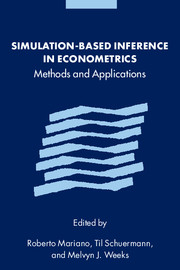Book contents
- Frontmatter
- Contents
- List of contributors
- Foreword by M. Hashem Pesaran
- Part I Simulation-based inference in econometrics: methods and applications
- Introduction
- 1 Simulation-based inference in econometrics: motivation and methods
- Part II Microeconometric methods
- Part III Time series methods and models
- Part IV Other areas of application and technical issues
- Index
Introduction
Published online by Cambridge University Press: 04 August 2010
- Frontmatter
- Contents
- List of contributors
- Foreword by M. Hashem Pesaran
- Part I Simulation-based inference in econometrics: methods and applications
- Introduction
- 1 Simulation-based inference in econometrics: motivation and methods
- Part II Microeconometric methods
- Part III Time series methods and models
- Part IV Other areas of application and technical issues
- Index
Summary
Although simulation-based inference (SBI) is a relatively new field in econometrics, the discipline has a long and rich history where simulation has provided a valuable methodological tool. The recent growth in the use of SBI stems from the seminal work of Lerman and Manski (1981), who proposed a computationally intensive procedure to circumvent the dimensionality problem common to estimation problems involving evaluation of high dimensional integrals. Although the method was in many ways pioneering, a number of problems with this procedure have prompted analysts to develop improved simulators. Key contributions by McFadden (1989) and Pakes and Pollard (1989) have resulted in the development of a wide range of simulation-based estimators with better finite sample properties.
In the wake of these developments, a substantial literature has emerged in the form of published and unpublished papers. At this juncture, it is dominated by discrete choice and limited dependent variable models, which deal with either cross-section or panel data. Some work has emerged in the time series literature, especially in the area of non-linear filtering, as well as Bayesian econometrics. The common thread that ties this body of work together is the estimation of behavioral models which contain numerically intractable conditional expectations. These conditional expectations are therefore simulated in order to estimate the underlying intractable expectations. This is in fact the essence of SBI.
In terms of pragmatics we wish to make what we feel is a critical distinction between the availability of this new technology and its productive use in a research setting.
Information
- Type
- Chapter
- Information
- Simulation-based Inference in EconometricsMethods and Applications, pp. 3 - 8Publisher: Cambridge University PressPrint publication year: 2000
